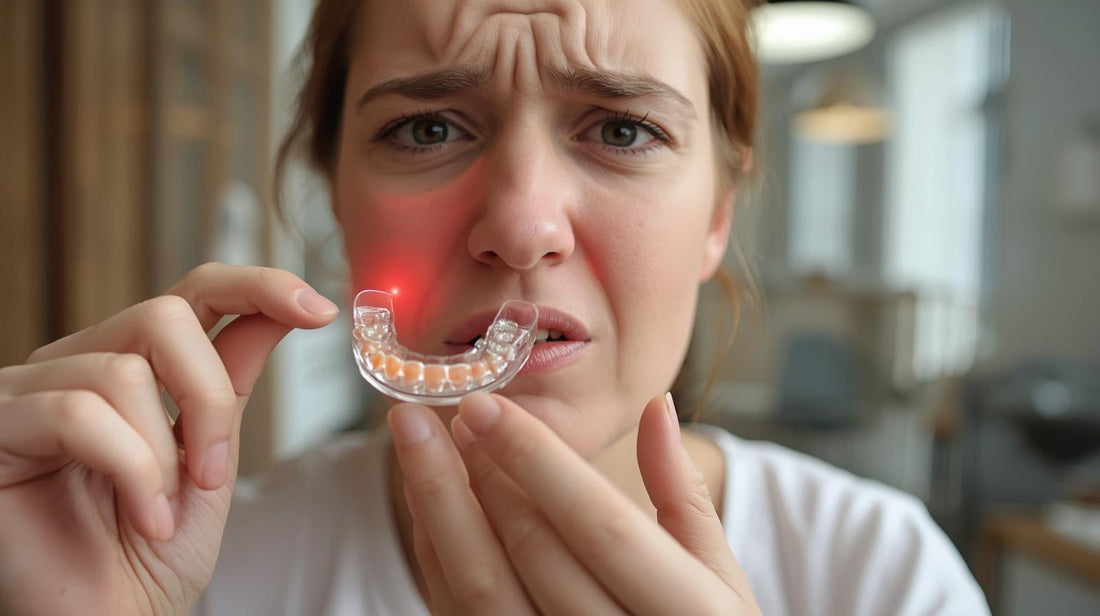
How to Tell If Your Current Mouthguard Is Making TMJ Worse
Share
In this post, I’ll break down how to spot the red flags, why your guard might be triggering your pain cycle, and what to do next if you’re clenching harder, sleeping worse, or feeling more misaligned than ever.
1. Your Jaw Pain Hasn’t Improved—or Gotten Worse
If you’ve been wearing a mouthguard for weeks or months and your:
-
Jaw still hurts in the morning
-
Pain has spread to your neck or ears
-
Clicking or popping has increased
-
Tension headaches are more frequent
…then it’s not working. Worse—it might be locking your jaw into a bad position.
🔗 See: What Causes Chronic Jaw Pain and How to Treat It
2. You're Waking Up Clenching Even Harder
Mouthguards are supposed to interrupt clenching.
But most only act as a cushion.
Your brain keeps clenching—but now it’s pushing into the guard, not your teeth.
This means:
-
More force = more muscle overuse
-
More tension = more inflammation
-
And eventually… worse TMJ symptoms
🔗 Related: What Is Bruxism, Really? The Difference Between Clenching and Grinding
3. It's Too Thick or Bulky
Many guards—especially boil-and-bite types—are:
-
Too thick
-
Poorly molded
-
Make it harder to close your lips or breathe
That leads to:
-
Mouth breathing (which weakens your jawline and posture)
-
Forward head posture
-
Misalignment of the bite
The result? You’re now clenching harder just to keep your jaw stable.
🔗 Explore: TMJ, Posture, and Whole-Body Alignment: What’s the Connection?
4. You Feel More Uneven in the Face or Jaw
A poorly designed guard can shift your bite asymmetrically—causing:
-
One-sided pain
-
Facial swelling
-
Masseter muscle hypertrophy
-
Visual facial asymmetry
If your face looks or feels off-balance, your current mouthguard is likely to blame.
🔗 See: TMJ and Facial Symmetry: The Connection Nobody Talks About
5. You’re Still Mouth Breathing at Night
Breathing through your mouth = poor sleep, poor posture, and a tight jaw.
Many guards unintentionally promote this by:
-
Blocking nasal airflow
-
Keeping the mouth open
-
Changing your tongue position
Reviv, on the other hand, supports nasal breathing and tongue-up posture.
🔗 Learn more: How Jaw Alignment Affects Your Breathing Without You Knowing
6. Your Posture Is Getting Worse
Your jaw affects your head, neck, spine, and shoulder alignment.
A bad guard can worsen:
-
Forward head posture
-
Neck tightness
-
Shoulder rounding
-
Overall balance and energy levels
You don’t need a “guard.” You need a postural retrainer.
🔗 Dive deeper: Beyond Jaw Pain: How TMJ Affects Your Overall Health and Posture
7. You’re Still Not Sleeping Well
TMJ is often a sleep problem in disguise.
If your guard:
-
Doesn’t let your jaw decompress
-
Keeps you in a clenched position
-
Disrupts your tongue or airway
...then it’s stealing your deep sleep.
🔗 Must-read: How to Improve Sleep Quality With Oral Appliance Therapy
8. You’re Still Grinding Through It
Even worse?
Many clenchers grind through their guard, damaging both the appliance and their teeth.
If your guard:
-
Has deep bite marks
-
Has cracked or thinned out
-
Doesn’t stop your jaw from engaging
…it’s not preventing damage. It’s just delaying it.
🔗 Related: How to Identify and Fix Jaw Clenching at Night
9. You Feel Tension in Your Neck and Shoulders
Still tight even after wearing your guard?
It’s likely forcing your jaw into a stress-loaded position, which creates:
-
Tight SCM and trap muscles
-
Forward head lean
-
Constant neuromuscular tension
The longer you wear it, the more your entire upper body compensates.
🔗 See also: Neck Tension, Jaw Clenching, and Headaches—Connected?
10. Your Guard Is Generic or One-Size-Fits-All
Let’s be blunt:
-
Most OTC guards are not made for people with TMJ
-
They're made for grinders without alignment issues
-
And they’re usually cheap, soft plastic with no repositioning benefit
If your guard isn't customized for jaw rest position, it's not helping.
So What Should a TMJ Mouthguard Do?
A real TMJ solution should:
✅ Reposition your jaw
✅ Retrain clenching reflexes
✅ Relieve muscle pressure
✅ Restore head, neck, and airway alignment
✅ Promote nasal breathing
✅ Support long-term structural change
🔗 That’s exactly what Reviv is built for: Reviv TMJ Mouth Guard: The Best Investment for Jaw Health
FAQs
1. Can a mouthguard really make TMJ worse?
Yes. The wrong type can lock your jaw into a poor position and worsen muscle tension.
2. What kind of guard helps TMJ?
One that supports jaw decompression, muscle retraining, and posture correction—like Reviv.
3. Is clenching harder with a guard normal?
No. If you're clenching harder, it's a sign your nervous system isn’t being reset.
4. Should I stop using my current guard?
If it’s making symptoms worse—yes. But replace it with one built for healing, not just protecting.
5. Can Reviv replace a dentist-made splint?
For many users, yes—especially if you’re clenching, not recovering from jaw surgery.
Final Verdict
Most mouthguards are made to protect teeth, not heal your jaw.
But if your current guard is making TMJ worse—it’s not just failing, it’s fueling the problem.
Reviv is different.
It’s not just a cushion.
It’s a biomechanical tool designed to reposition, retrain, and relieve.
👉 Buy Reviv Mouthguard Now
And give your jaw the rest it actually needs.
